#9: Chantilly Lace/Love Me Baby by the Beavers
City: Halifax, NS
Radio Station: CJCH
Peak Month: July 1964
Peak Position in Halifax ~ #2
Peak position in Vancouver ~ did not chart
Peak Position on Billboard Hot 100 ~ did not chart
YouTube: “Chantilly Lace“/”Love Me Baby”
Lyrics: “Chantilly Lace”
Lyrics: N/A
The Beavers were a band that comprised of Bill Schnare on lead guitar and backing vocals, Dave Isner on bass guitar, Doug Billard on lead vocals, Gerry Archer on drums, and Wayne Forrest on rhythm guitar. According to Jim Rice of Nova Scotia Classic Rock, the Beavers formed in 1962. However, Discogs has the band forming in 1963, and originally as the Shadows. In the Discogs version of things, presumably with the popularity of Cliff Richard and the Shadows, they switched to the Beavers.
As a gimmick, the Beavers all wore Mohawk haircuts. Doug Billard was the lead singer for the band.
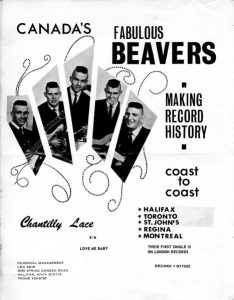
The Beavers released a cover of the Big Bopper hit from 1958 titled “Chantilly Lace”.
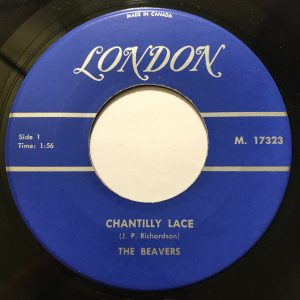
“Chantilly Lace” was written by J.P. Richardson (aka The Big Bopper). Jiles Perry Richardson Jr. was born in Sabine Pass, Texas, in 1930. He worked part-time at KTRM in Beaumont (TX) and became a full-time DJ by 1949. In March 1955, he was drafted into the United States Army and did his basic training at Fort Ord (CA). He spent the rest of his two-year service as a radar instructor at Fort Bliss in El Paso, Texas. Following his discharge as a corporal in March 1957, Richardson returned to KTRM radio, where he held down the “Dishwashers’ Serenade” shift from 11 am to 12:30 pm, Monday through Friday.
Richardson came up with the nickname “The Big Bopper” while working as a DJ at KTRM in Beaumont (TX). He had seen teenagers in 1957 doing a new dance called The Bop. The Big Bopper had been a record-breaking radio DJ with a 122-hour marathon stint.
The Big Bopper’s original version of “Chantilly Lace” was a #2 hit in Toronto, #3 in Edmonton, #4 in Vancouver and Montreal, #6 in Yorktown (SK), #7 in Calgary, #8 in Oshawa (ON), and #9 hit in Winnipeg and Truro (NS). In the fall of 1958, the song peaked at #6 on the Billboard Hot 100 and #4 on the Cashbox Top 100 Singles chart. J.P. Richardson wrote “Running Bear”, which became a number-one hit for Johnny Preston in 1959. He also wrote “White Lightning” which topped the Country charts for George Jones that same year.
On January 23, 1959, Richardson joined Buddy Holly, Ritchie Valens and Dion & the Belmonts for a Winter Dance Party tour.
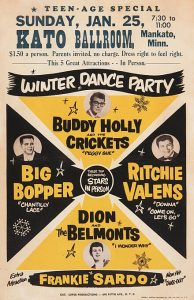
It was a grueling tour:
January 23 – Milwaukee (WI)
January 24 – Kenosha (WI)
January 25 – Mankato (MN)
January 26 – Eau Claire (WI)
January 27 – Montevideo (MN)
January 28 – St. Paul (MN)
January 29 – Davenport (IA)
January 30 – Fort Dodge (IA)
January 31 – Duluth (MN)
February 1 – Green Bay (WI)
February 2 – Clear Lake (IA)
And at this point there were still thirteen more stops:
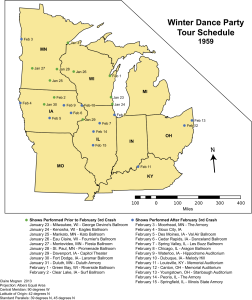
Throughout the tour, with the Interstate Highway system in its infancy, the daily commute between venues was up to 400 miles a day in freezing conditions. Buddy Holly had arranged for a small plane to take him to Fargo, North Dakota, to avoid another long day on the tour bus. Holly asked some of the other headliners if they wanted to join him and flip coins to see who would get a seat. Some reports suggest that Richardson had developed a flu by February 2. However, Dion DiMucci said in an interview in 2009, it was Valens, not Richardson, who had fallen ill. Valens and Dion flipped a coin for a seat on the plane. Dion said he won the toss, but ultimately decided that since the $36 fare equaled the monthly rent his parents paid for his childhood apartment, he could not justify the indulgence. Waylon Jennings, who was in Buddy Holly’s band, lost a coin toss and J.P. Richardson won a seat on the flight.
But on February 3, 1959, The Big Bopper died in a small plane crash along with Ritchie Valens and Buddy Holly near Clear Lake, Iowa. The Beechcraft 35 Bonanza plane took off from the Mason City Municipal Airport (Mason City, IA) at 12:55 AM on February 3, 1959. There was light falling snow and winds from 20 to 30 mph. Minutes into its brief flight, by 1:00 AM there was no radio contact with the plane. The plane crashed just six miles northwest of the airport.
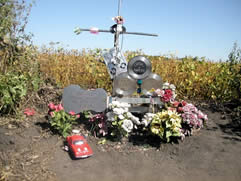
Crash site memorial
The 21-year-old pilot, Roger Peterson, had logged 52 hours of instrument flight training, although he had passed only his written examination. He was not yet qualified to operate in weather that required flying solely by reference to instruments. Peterson and Dwyer Flying Service itself were certified to operate only under visual flight rules, which essentially require that the pilot must be able to see where the aircraft is going. On the night of the accident visual flight would have been virtually impossible due to the low clouds, the lack of a visible horizon, and the absence of ground lights over the sparsely populated area
Richardson was survived by his wife and five-year-old daughter. His son, Jay Perry, was born two months later in April 1959. At the time of his death, Richardson had been building a recording studio in his home in Beaumont, Texas, and was also planning to invest in a radio station. He had written 20 new songs he planned to record himself or with other artists.
In the midst of the British Invasion, The Beavers were offering a flashback to the early rock era. “The Day the Music Died” on February 3, 1959, had only grown five years later as an iconic marker in the brief (at the time) history of rock ‘n roll. The crash that killed the pilot, Holly, Valens and J.P. Richardson was later recalled in the 1972 number-one hit by Don McLean titled “American Pie”.
“Chantilly Lace” is a song about a guy who acts real funny and spends his money all for a girl named “Chantilly Lace”. She has i) a pretty face, ii) a pony tail a-hangin’ down, iii) a wiggle in her walk, iv) a giggle in her talk, v) big eyes, and vi) she
“makes the world go ’round.” Most importantly, she know what he likes and has fulfilling her requests: “pick me up at eight, and don’t be late…”
The Beavers cover of “Chantilly Lace” infused the song with British Invasion echoes of the Dave Clark Five, the Honeycombs and the Beatles. In the summer of 1964, the Beavers cover of “Chantilly Lace” peaked at #2 in Halifax, and charted in Regina (SK) and Toronto, among other Canadian radio markets.
The B-side of the single was “Love Me Baby”.
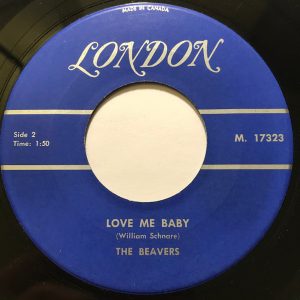
“Love Me Baby” was written by Beavers’ lead guitarist Bill Schnare. The song is a plea for the one a guy adores to verbally express that she returns the attraction: “say you love me too.”
“Love Me Baby” peaked at #2 in Halifax and charted in Montreal.
In late 1964, the Beavers took the name The Great Scots. Their road manager was 19-year-old Mike Duffy – at the time a DJ and TV personality in Amherst, Nova Scotia, who later became a CTV reporter and Canadian senator.
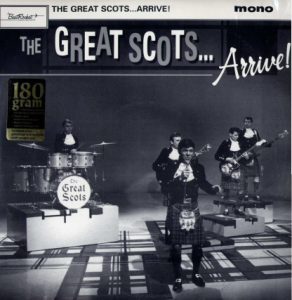
The band ditched their mohawk haircuts as the Beavers,
and now wore tartan kilts as the went on stage as The Great Scots.
Hailed in the Canadian press as “Canada’s answer to the Beatles,” the group flew down to California in 1965, looking for bigger horizons to conquer. Working out of Hollywood during that time period, the group capitalized on their Scottish heritage and wore Nova Scotian tartan kilts onstage, causing quite a stir everywhere they played. Hooking up with producer (and Challengers drummer) Richard Delvey, the Scots hit the charts with “Give Me Your Lovin'” which charted into the Top 20 in Syracuse (NY), and Albany (NY). “That’s My Girl Rotten To The Core” charted in San Antonio (TX), and the flip side “Lost In Conversation”, charted to #16 in Halifax. In 1965, the B-side of “Run For Your Life” titled “Ball And Chain” reached #12 in Santa Barbara (CA). And in 1966 The Great Scots were back on the Top 40 in Santa Barbara with “The Light Hurts My Eyes”.
While they were aspiring for big things, The Great Scots appeared on both Shindig! and American Bandstand. They also were an opener for Herman’s Hermits at the Rose Bowl in Pasadena, California, on August 7, 1965. The audience numbered over 100,000.
In 1966, the band changed their name to The Free-For-All. They released a cover of the 1956 Fats Domino hit “Blue Monday” on the Challenge label. The single charted in Albany (NY) in the fall of 1966. Jim Rice at Nova Scotia Classic Rock writes, “At this time the band performed primarily in Canada and the southwestern United States. While working on their first album, the US armed forces drafted the band’s bass player (Gerry Archer) and the LP was never completed. Although a Canadian citizen, he had been working with a permanent visa which left him susceptible to the military draft.
The Free-For-All released two more singles in 1968 on Dot records. Jim Rice writes that “The members still live close to each other and reunite regularly.” In 1997 several CD compilation albums were released capturing most of the recorded material by The Great Scots/Beavers/The Free-For-All. On May 8, 2009, The Great Scots played together for the first time since Gerry Archer left the band in early 1967. The venue in 2009 was The Seahorse Tavern in Halifax.
Oddly, though the Beavers had played concert dates in Canada, when the band changed their name to The Great Scots all their gigs were in the USA. So, fans of the renamed band that played British Invasion sound-a-like tunes had to wait until 42 years after the breakup in 1967 to hear The Great Scots on Canadian soil.
March 13, 2024
Ray McGinnis
References:
Jim Rice, “The Great Scots,” Nova Scotia Classic Rock.
“Chantilly Lace” by the Big Bopper at #4 on the Cashbox Top 100 Singles chart, October 25, 1958.
“Rock ‘N Roll Singers Die in Air Crash,” Eugene Register-Guard, Eugene (OR), February 3, 1959.
Meagan Paese, “The Big Bopper,” The History of Rock and Roll.
Alan Lee Haworth, “Richardson, Jiles Perry [The Big Bopper] (1930-1959),” Texas State Historical Association, December 1, 1995.
Mark Black, “Great Scots! reunite, play first ever Canadian show,” The Coast, Halifax, Nova Scotia, May 7, 2009.
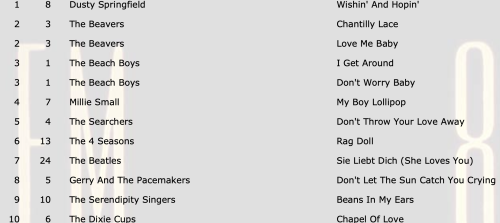
CJCH 920-AM Halifax (NS) Top Ten | July 3, 1964

Leave a Reply